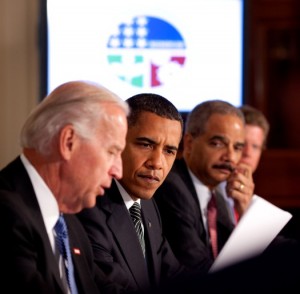 Last June we wrote about President Obama’s anti-poverty initiative called “My Brother’s Keeper.” The initiative focuses on “access to early childhood supports; grade school literacy; pathways to college and a career, including issues arising from school disciplinary action; access to mentoring services and support networks; and interactions with the criminal justice system and violent crime.”
Last June we wrote about President Obama’s anti-poverty initiative called “My Brother’s Keeper.” The initiative focuses on “access to early childhood supports; grade school literacy; pathways to college and a career, including issues arising from school disciplinary action; access to mentoring services and support networks; and interactions with the criminal justice system and violent crime.”
While the goals are noble, the program completely fails to acknowledge the role marriage plays in preventing poverty and shaping children into productive adults.
Following criticism that My Brother’s Keeper focuses on young men to the exclusion of women, the White House has announced plans for a new initiative: “Women and Girls of Color: Addressing Challenges and Expanding Opportunity.”
In summarizing the necessity of the program, the White House Council on Women and Girls writes,
“Girls of color still lag behind in their performance on standardized tests, and they are more likely to be suspended from school. Women and girls of color still face higher rates of poverty and receive lower wages for their work than their white peers, and they are more likely to become involved in the criminal justice system. Women of color still have some of the highest rates of heart disease, obesity, diabetes and other serious conditions, and they experience high rates of domestic violence. And when women are the primary or sole breadwinners for nearly half of all households of color, these disparities do not just affect them, but their families and communities as well.”
The initial 54-page report on the program outlines strategies for assisting girls and young women in areas of education, economic security, health, domestic violence, and criminal justice.
Here’s the problem: In all 54 pages, we could not find one mention of the word “marriage,” and we only found 4 instances of the word “father”–despite the fact that, statistically speaking, marriage and fathers have profoundly positive impacts on the lives of children.
The Women and Girls of Color initiative seeks to improve education among young women; decrease discipline problems at school; prevent crime; increase wages among young women; improve health; and decrease violence. Coincidentally, children in stable homes with a married mother and father are less likely to live in poverty; have fewer discipline problems at school; are less likely to commit a crime; enjoy better health; earn higher wages as adults; and are less likely to be the victims of violence.
The White House is repeating the same mistake it made with My Brother’s Keeper: If you want to help children out of poverty, one of the best things you can do is implement policies that maximize the possibility their parents will get married and stay married.
What’s particularly striking about this latest initiative from the White House is that it will deal in part with teen pregnancy, “supporting pregnant and parenting students,” access to fertility treatment, availability of contraception, and programs in which social workers will visit the homes of at-risk families to provide education and assistance. The program acknowledges parents and children; it focuses extensively on young mothers; but marriage never even enters the conversation.
Just like My Brother’s Keeper, the Women and Girls of Color Initiative seems to be another government program bent on solving many problems that parents and healthy marriages seem to solve or prevent naturally. I realize many people may see a program like this as a waste of tax dollars to begin with, but if you really want to reverse trends in poverty, juvenile delinquency, education, and violence, then you simply cannot afford to ignore marriage.
You Can Read the Entire Report from the White House Here.
READ MORE

 Last June we wrote about President Obama’s anti-poverty initiative
Last June we wrote about President Obama’s anti-poverty initiative